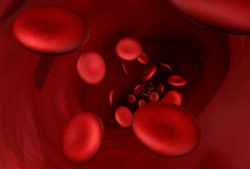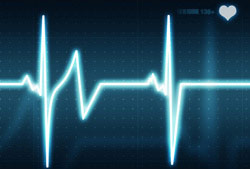
Matters of the heart have baffled humans since the dawn of time, with sonnets and entire books devoted to the meaning of love. Now scientists are finding that the blood pump in your chest is just as complex. You can't live or love without it. Find out the sappy (多汁液的) scoop [通气(或通水)口] on the heart, including how sex and laughter are indeed good for it, and how bad news really can break it. -- Jeanna Bryner

Photo Credit: Dreamstime.com
Sex Appeal
If you can't make it to the gym, try fooling around. Your heart might thank you. A study of 2,500 men aged 49 to 54 found that having an orgasm (极度兴奋;性高潮) at least three times a week cut in half the likelihood of death from coronary ( 冠状的) heart disease. And barring (不包括) underlying health issues and the possibility of contracting a sexually transmitted disease, sex can give you a workout (考验,锻炼). By some estimates, a vigorous sex session can double a person's heart rate and burn up about 200 calories, or the equivalent of a brisk ( 轻快的) 15-minute run. So staying in bed might be just what the doctor orders.

Sanja Gjenero / Stock.XCHNG
Female Hearts
Girls rule in some matters of the heart, but when it comes to research into cardiovascular (心脏血管的) disease it's the guys who come into the spotlight. For decades, heart disease and heart attacks have been viewed as a man's illness. But this is far from the truth. Heart disease kills 500,000 American women each year, topping male numbers by 50,000. Another gender gap: Women don't tend to experience the Hollywood-standard heart attack in which gripping (剧[阵]痛) chest pain sends you keeling over. Instead, women have reported tightness, aching or pressure in the heart, plus other symptoms like nausea (恶心), back and jaw pain.
Photo Credit: Dreamstime.com
Heart Mend
A love-torn heart can be painful enough to make you wish you could get a new heart or at least a cardio (心脏) repair kit (工具包). Both of the latter options could some day be realities. Scientists are studying the red-spotted newt (蝾螈) to help them develop cell therapies for humans with physically damaged hearts. This amphibian (两栖动物) can turn its cells back in time, as if they were stem cells (干细胞), in order to build up new heart muscle. In another study, scientists engineered a beating heart from embryonic (胚胎的) stem cells in the lab.

Photo Credit: Sergei Krassii / Stock.XCHNG
Heart-to-Heart
A seemingly sheepish look from Fido or that endearing (令人钟爱的) brush-by from your cat can make you wonder if your pet could possibly communicate with you. A recent study adds equine (属于马科的动物,包括马,驴,斑马) friends to the list of emotionally-responsive animals. A scientist found that horse's heart rates mirror those of human subjects touching them. The horse emotion-detector could someday replace procedures used to measure a patient's stress hormones. Next, the researcher will study service dogs to better match them with humans.

Photo Credit: Dreamstime.com
Big Hearts
Some people really do have bigger hearts than others. Rather than a sign of affection, an enlarged heart can signal underlying heart disease. The most common type, called dilated (扩大的;膨胀的) cardiomyopathy ([医](尤指原发性的)心肌症), occurs when the heart's chambers (心室) stretch out and enlarge. The bulging (膨胀) saps (逐渐侵蚀) the heart's pump power, depriving the body's organs of enough blood. If left untreated, a big heart can lead to heart failure.

Photo Credit: Dreamstime.com
LOL (Laugh Out Loud,大声笑): It's Good for You
A hearty laugh the kind that sends a stream of tears from your eyes does more than warm the soul. Research has shown the guffaw (狂笑;大笑) can cause the lining of blood vessel walls called endothelium (内皮:被覆于浆液腔、淋巴管及血管的扁平上皮细胞的薄层) to relax, increasing blood flow for up to 45 minutes after the laugh attack. Damage to the endothelium can lead to the narrowing of blood vessels and eventually cardiovascular diseases. That's no laughing matter...or maybe it is...

Photo Credit: Stockxpert
Drink to Your Heart
A glass of Merlot (墨尔乐红葡萄酒) can go straight to the heart, and recent research shows that so too can the white variety. Scientists have attributed the heart benefits of reds to grape skins, which are chock full of certain antioxidants ([化]抗氧化剂, 硬化防止剂). Since the purple-hued skins get removed to make Chardonnays[夏敦埃酒(一种类似夏布利酒的无甜味白葡萄酒)], many scientists had assumed white wine likely wouldn't do the heart any good. A lab experiment on rats showed that a grape's pulp [(水果的)果肉] conceals cardio-protective compounds that rival those found in reds. Red or white? Just follow your heart.

Photo Credit: Dreamstime.com
Powerful Pump
In under a minute, your heart can pump blood to every cell in your body. And over the course of a day, about 100,000 heart beats shuttle (穿梭往返运输) 2,000 gallons of oxygen-rich blood many times through about 60,000 miles of branching blood vessels that link together the cells of our organs and body parts. That's a hefty (重的) job for a fist-sized muscle.

Photo Credit: National Heart, Lung and Blood institute
Broken Heart
Alas (哎呀,哎:用来表示悲痛、懊悔、伤心、怜悯,或对危险、邪恶的恐惧), a broken heart can cause one to swoon. A breakup with a loved one or news of a family death literally can lead to broken hearts in the form of heightened risk for heart attack, studies have shown. Such trauma can also trigger the release of stress hormones into the bloodstream that temporarily "stun" the heart. The resulting symptoms mimic (模仿) those of a heart attack - chest pain and shortness of breath - but this type of achy heart can bounce back in days with some TLC and rest.

Photo Credit: Dreamstime.com
Love Sign
Weighing in at 10 ounces (1 盎司 = 31.10克), the blood-filled muscle called the heart has become the universal symbol of love. The Greeks believed the heart was the seat of the spirit, the Chinese associated it with the center for happiness and the Egyptians thought the emotions and intellect arose from the heart. No one is sure the exact origin of the love association, however. One idea is that the heart got its "love mark" in the ancient Greek city of Cyrene, now in modern-day Libya. The colony was known for a plant called Silphium, with heart-shaped seed pods ([植]心皮). Silphium had medicinal properties, and possibly also was used as an herbal contraceptive (避孕品).


